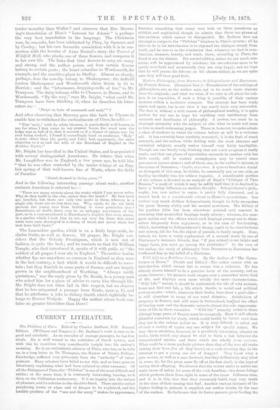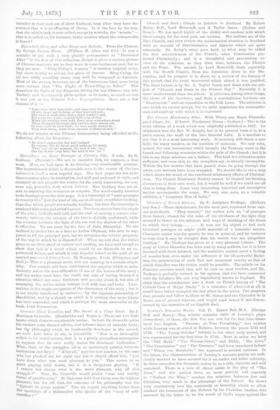Wild Life in a Southern County. By the Author of
"The Game- keeper at Home." (Smith and Elder.)—The writer comes with an introduction which cannot fail to secure him a welcome. He has already shown himself to be a genuine lover of the country, and an acute observer ; his present work ranges over a somewhat wider field of life, and displays even more vividly the same characteristics. "Wild Life" means, it should be understood, the life of wild animals, boast and bird and fish, a life which, thanks to social and political arrangements—which, whatever their faults, here show a good side'— is still abundant in many of our rural districts. Subdivision of property in Franco, and still more in Switzerland, has:had the effect of leaving man and the domestic animals almost the solo representa- tives of life in those countries. " Wild life" scarcely exists in these (though large parts of France must be excepted). Here it still affords Plentiful materials for study, which could hardly be better used than they aro in the volume before us. It is very difficult to select out of such a variety of topics any one subject for special notice. We may direct attention, however, to a peculiarly interesting chapter on rooks, birds which may almost be said to form a link between the domesticated species and those which are wholly ferns naturae. What could be a more pathetic picture than that of the two old rooks risking their lives (for all they know) on a rook-shooting day, in the attempt to get a young one out of danger ? They know what a gun moans, as well as a man knows it, but they deliberately stay (that is, some do, for the great mass fly off at the first shot), in the hope of saving their offspring. We observe that the writer omits to notice one main cause of safety for some of the rook families,—the dense foliage which protects thorn from sight in some of the trees. Different elms, and it is in this tree that they commonly build, vary very much in the time of their coming into loaf. Another curious instance of the higher feeling in animals is supplied, o'ur author thinks, by the case of the cuckoo. Ho fools sure that its foster-parents go on feeding the
intruder in their nest out of sheer kindness, long after they have dis- covered that it is no offspring of theirs. Is it the fact, by the way, that the stickleback is ever called, except by mistake, the "minnie,"— that it is called so, for instance, in the streams whore the minnow also is found ?



































 Previous page
Previous page